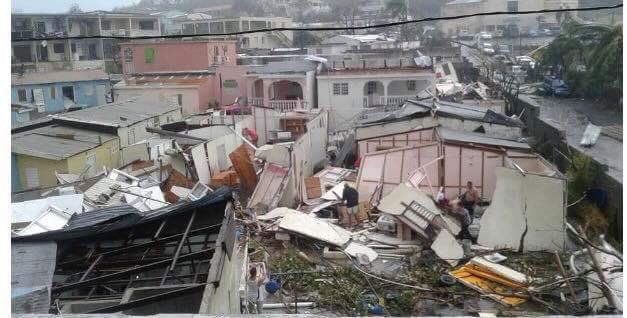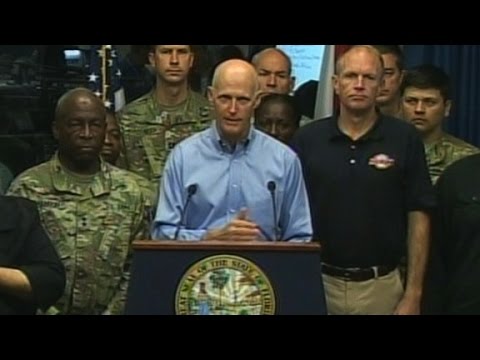Caribbean Islands Pleaded for Climate Action. Hurricane Irma Shows Why.
President Trump's decision to withdraw from the Paris agreement on climate change was met with dismay among Caribbean leaders

Parts of the Caribbean island of St. Martin were left flooded Wednesday after Hurricane Irma hit. (Image: Screenshot/CNN)
Some of the small Caribbean islands that are expected to suffer the most damage from Hurricane Irma have had some of the loudest voices in recent months regarding the effects of climate change—and the harm being done by leaders including President Donald Trump, who withdrew the United States from the Paris climate accord in June.
Images of the storm's destruction on St. Martin, Anguilla, and Barbuda on Wednesday confirmed many Caribbean leaders' concerns:
Some images of the destruction wrought by #hurricaneirma2017in the #Caribbean on #StMartin #Anguilla#Irma #HurricaneIrma#Barbuda
Last week at a meeting about infrastructure aid, the prime minister of St. Lucia, which lies to the south of Irma's path and has offered to serve as an evacuation point for its neighboring islands, implored developed nations to help the Caribbean to combat the effects of climate change.
Prime Minister Allen Chastanet said Small Island Developing States (SIDS) stand to sustain some of the most severe damage from climate change if larger, wealthier nations don't accept climate scientists' consensus that human activity contributes to global warming, and work to reverse the impact of greenhouse gases.
"I am going to keep pounding on the table and letting my voice be heard explaining that the SIDS cannot wait," said Chastanet. He mentioned the catastrophic damage brought in 2016 by Hurricane Matthew, a Category 5 storm that left Haiti with its worst humanitarian crisis since the earthquake that struck the country in 2010.
"There is no greater example of that than what took place in Haiti," he said. "Did we not know that Haiti was in a hurricane belt? Did we not know that there was clearly a trend of increasing storms?"
When Trump announced that he would stop implementing the Paris accord, declaring it "a bad deal" for Americans, the U.S. ended its contributions to the U.N. Green Climate Fund, which helps developing countries to reduce their greenhouse gas emissions and adapt to climate change. The decision was met with shock by leaders in the Caribbean, where islands are especially at risk for the rising sea levels and intense hurricanes brought by global warming.
"Climate change is a real problem and it requires all of us to leave a sustainable planet to the next generation," said Governor Ricardo Rosselló of Puerto Rico, where officials issued flash flood warnings in preparation for Irma on Wednesday afternoon. "We call upon all local governments across the nation to continue to pass rules and regulations that protect our climate. As most of the world moves forward, our nation cannot sit idle and lag behind."
The Caribbean Hotel and Tourism Association, a coalition of businesses that contribute to one of the region's major economic sectors, spoke out against Trump's decision as well. "The Caribbean is one of the world's most vulnerable regions to the escalating effects of climate change," said the group. "The socio-economic consequences from rising sea levels and temperatures, increasingly violent storms and severe droughts, oil spills, mismanagement of waste, and coral bleaching are having mounting consequences, and left unchecked threaten the very viability of the region's economies and societies, and the health and welfare of Caribbean people."
While hurricanes are naturally occurring weather events, climate change has contributed to the severity of recent hurricanes and tropical storms, as noted by the tourism group. "Unfortunately, the physicality is very clear," said climate scientist Anders Levermann of the Potsdam Institute for Climate Impact Research in a statement to Bloomberg. "Hurricanes get their destructive energy from the warmth of the ocean, and the region's water temperatures are super elevated."
While the Caribbean nations in Irma's path have sounded alarms about climate change, Republican Gov. Rick Scott of Florida, which Irma is also expected to hit, has been skeptical of the link between human activity and global warming. In 2010 Scott said, "I've not been convinced that there's any man-made climate change," and this year he backed Trump's withdrawal from the Paris accord.
This work is licensed under a Creative Commons Attribution-Share Alike 3.0 License







0 Comments:
Post a Comment
Subscribe to Post Comments [Atom]
<< Home